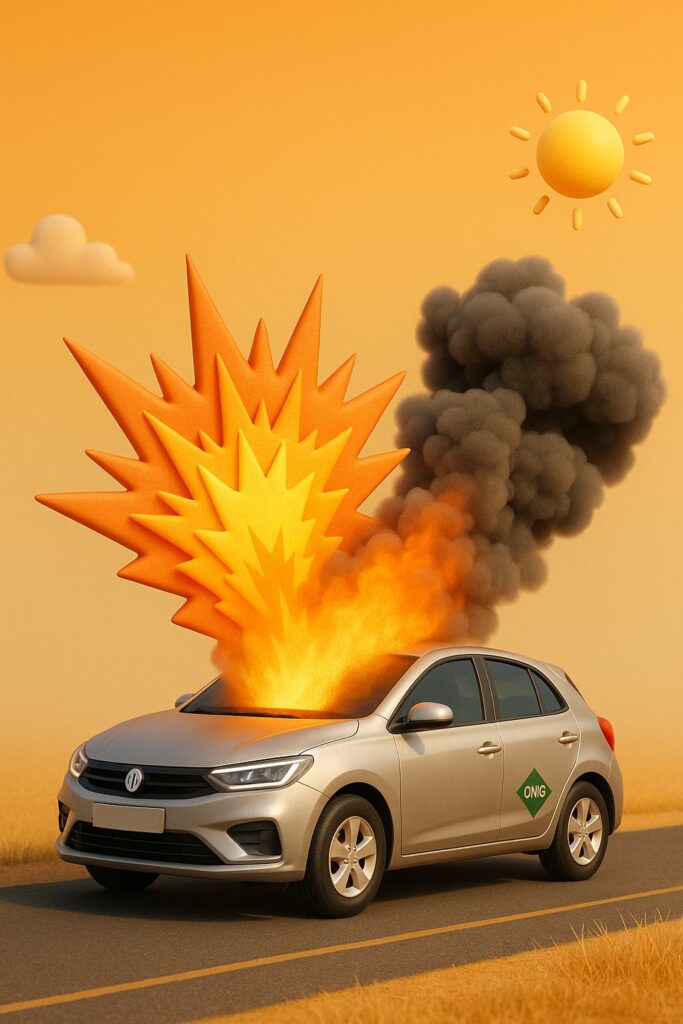CNG Cars Blast news often dominates the headlines as soon as the summer season begins. Every year, we hear about explosions in CNG-fitted cars, especially during the hotter months. This makes many people afraid to use CNG vehicles. But are CNG cars really dangerous, or do such incidents happen due to poor maintenance or technical faults? In this blog, we will find out the real reason behind CNG cars blast and whether they are truly unsafe for daily use.

What is CNG & How Does It Work?
CNG (Compressed Natural Gas) is an eco-friendly fuel which is stored in a cylinder at high pressure (200 bar).
The gas is taken out from the cylinder and goes to the engine through the fuel line, where the engine runs after ignition. This makes it clear that this is a high pressure gas and it is very important to follow its safety norms.
Why CNG Car Blast in Summer?
1. Extreme Heat
In summer, the temperature reaches 45-50°C, which increases the pressure inside the fuel tank and increases the chances of the tank bursting.
If the pressure release valve or cylinder testing is not done properly, the risk of blast increases.
2. Faulty or Aftermarket CNG Kits
Use CNG kits approved by our RTO, using non-RTO approved kits is the biggest reason for blast.
Sometimes local fitting shops do not follow safety rules like loose wiring, poor quality pipes, weak joints. This is also a reason for blast.
3. Neglected Cylinder Testing
According to RTO rules, it is mandatory to get cylinder hydro tested every three years. Without testing the cylinder becomes weak, which may blast in summer.
4. Gas Leakage & Poor Maintenance
If there is a leakage or faulty shut-off valve in the CNG line, the gas accumulates, which can explode with a small spark.
5. Illegal Modifications
Sometimes people make wrong modifications like parcel tray on cylinder, placement of AC condenser in the heat area – all are illegal and dangerous modifications. Some people get an extra tank fitted which is outside the company design.
Real Cases in India (2024–2025 Highlights)
| Location | Car Type | Blast Reason | Outcome |
| Delhi | Wagon R (CNG) | Cylinder pressure valve fail | 1 injured |
| Kanpur | Local CNG Kit Alto | Gas leakage spark | Car total loss |
| Pune | Taxi (CNG) | No cylinder testing for 5 years | Fatal |

How to Avoid CNG Cars Blast in Summer?
If you also want to avoid CNG cars blast and want to keep yourself and your car safe, then you should follow some safety tips.
- Always install company-fitted CNG kit.
- Hydro testing of cylinder should be RTO-approved every 3 years.
- Always install gas leak detector whose cost is only ₹1500–₹2000.
- Where there is a CNG cylinder, do not do any desi jugaad or modification.
- Never park your car in direct sunlight.
- If the heat is getting too much, never full the tank, always keep some empty.
- Get service done after 5000 km and 6 months.
- Get a fire extinguisher installed in the vehicle.
Is CNG Still Safe?
Yes – CNG is safe if you use the company fitted kit and follow all safety norms then cng is safe. Most CNG cars blast cases happen due to unauthorized kits or poor maintenance. CNG remains a safe and eco-friendly fuel option.
Myth vs Reality
| Myth / Fear | Reality |
|---|---|
| CNG cars blast every summer. | No — The risk increases only in poorly maintained cars or those with substandard kits. |
| CNG is always more dangerous. | No — With the right kit, high-quality cylinder, and proper maintenance, safety is high. |
| Low Cost CNG = Risk. | True — Cheap kits and fake cylinders carry higher risk. But certified products can be completely safe. |
Final Verdict
Most Common Reasons Behind Why CNG Car Blast–
- Faulty accessories, short circuits, or ignition sources
- Poor quality kits / unauthorized installation
- Lack of maintenance
- Overheating
But the good news is — These risks can will be reduced with user awareness, regular servicing, and the use of quality components.
If You Are a CNG Car Owner or Planning to Buy One, Make Sure–
- The kit is company-fitted or RTO-approved.
- Cylinder undergoes regular hydro testing.
- Any smell of gas is addressed immediately.
- Avoid faulty wiring or unauthorized accessories.
- During summer, avoid overfilling and always park in shaded areas.
Disclaimer: This content is for public safety awareness. Data is based on current cases of 2025 & expert opinions. Before taking final decisions, please get the inspection done from a certified workshop.
